MINNESOTA CELEBRATES JUNETEENTH AS A STATE HOLIDAY FOR THE FIRST TIME
 BY MILKEE BEKELE PAGE 5
BY MILKEE BEKELE PAGE 5























































 BY MILKEE BEKELE PAGE 5
BY MILKEE BEKELE PAGE 5























































In 2019, my daughter Jennifer and I took part in a Congressional Delegation to Ghana that included my good friend, the late Congressman John Lewis. Our visit was to commemorate the 400 years since Blacks were forcibly taken from the continent of Africa and enslaved in America. During that visit, Jennifer and I stood silently in the “door of no return,” holding hands. I never asked her about her thoughts, and she did not ask me about mine. Last Saturday, she and her husband joined me at the dedication of the International African American Museum (IAAM) in Charleston. It is fitting that IAAM stands on the site of Gadsden’s Wharf, where nearly half of all enslaved Africans brought to this continent arrived.
When I was asked by then-Charleston Mayor Joe Riley 23 years ago to chair the steering committee to develop his vision of establishing such a museum in Charleston, I thought of the countless slaves that were stolen from their homeland, stripped of their identities, and brought to this strange land in shackles. But I also thought of the African Americans who rose above the circumstances of their ancestors and their countless descendants eager to honor their memories. I said during my dedication remarks that IAAM tells the story of perseverance through the middle passage, resistance to enslavement, triumphs over Jim Crow, and significant contributions to the greatness of this country.
In the early days of our efforts, there was significant debate about the focus of the museum. But I knew we had to do justice to all 400 years of the Black experience in America. On the day we broke ground on IAAM, another good friend, Congressman Elijah Cummings, was being funeralized in Baltimore, Maryland. Elijah was the great-great-grandson of Scippio Rhame, who, until he was freed in 1868, worked the same land as Elijah’s parents, who were sharecroppers.
Because of his parents’ participation in the great migration, Elijah was born and grew up in Baltimore, Maryland, where Elijah was placed in special education classes. He overcame that profiling and graduated college, Phi Beta Kappa. He became an accomplished lawyer, rose to serve in the United States Congress, and became Chairman of the powerful Oversight Committee. IAAM tells the story of the ancestors and descendants of Scippo Rhame, and countless others with similar backgrounds and experiences.
Those stories are about more than the institution of slavery—they are uplifting experiences that epitomize the varying possibilities of who we are and what we can—and have—become. In that spirit, IAAM has established a one-of-a-
kind center dedicated to African American genealogy research. The Center for Family History hosts a growing collection of photos, historical documents, and family histories that the public can comb through to find more information about their family trees.
To help bolster their records, the IAAM Center for Family History has issued an open call for obituaries, photos, family histories, and other historical documents. It is not lost on me that at the site where some researchers say half of all African Americans arrived in this country will sit a museum committed to reunifying their descendants with lost histories.
There is significant currency in the museum’s acronym, “IAAM.” In my office is a statue of a sanitation worker holding a sign with a simple message: “I am a man.” This statue tells the story of the 1968 Memphis Sanitation Workers’ strike, born out of anger over the deaths of Black sanitation workers Echol Cole and Robert Walker, who were killed on the job by malfunctioning equipment. The primarily Black sanitation force demanded recognition of their union, improved safety standards, and a living wage. It took nearly 2 months and the death of Dr. Martin Luther King, Jr., but in the end, their demands were met. The museum’s acronym, “IAAM,” serves to recognize their struggle and ultimate success.
I often quote George Santayana’s admonition, “Those who do not remember past lessons are condemned to repeat them.” African American history encompasses far more than the horrors of those who were enslaved. Their countless descendants include history-making visionaries, and IAAM honors and preserves their struggles and accomplishments and dares us to look toward the future.
I must admit that there were times during my chairmanship, especially in those early days, when I was not sure we would get this project across the finish line. I am proud that after more than 20 years of hard work and dedicated commitment, we are celebrating its opening, and future generations can learn fuller and more accurate stories of America’s greatness.
The author represents South Carolina’s Sixth Congressional District in the U.S. House. He is also the assistant Democratic leader in the House.
ATLANTA (AP) — Entering court using a walker, a doctor’s note clutched in his hand, 70-year-old Dana Williams, who suffers serious heart problems, hypertension and asthma, pleaded to delay eviction from his two-bedroom apartment in Atlanta.
Although sympathetic, the judge said state law required him to evict Williams and his 25-year-old daughter De’mai Williams in April because they owed $8,348 in unpaid rent and fees on their $940-a-month apartment.
They have been living in limbo ever since.
They moved into a dilapidated Atlanta hotel room with water dripping through the bathroom ceiling, broken furniture and no refrigerator or microwave. But at $275-a-week, it was all they could afford on Williams’ $900 monthly social security check and the $800 his daughter gets biweekly from a state agency as her father’s caretaker.

“I really don’t want to be here by the time his birthday comes” in August, De’mai Williams said. “For his health, it’s just not right.”
The Williams family is among millions of tenants from New York state to Las Vegas who have been evicted or face imminent eviction.
After a lull during the pandemic, eviction filings by landlords have come roaring back, driven by rising rents and a long-running shortage of affordable housing. Most low-income tenants can no longer count on pandemic resources that had kept them housed, and many are finding it hard to recover because they haven’t found steady work or their wages haven’t kept pace with the rising cost of rent, food and other necessities.
Homelessness, as a result, is rising.
“Protections have ended, the federal moratorium is obviously over, and emergency rental assistance money has dried up in most places,” said Daniel Grubbs-Donovan, a research specialist at Princeton University’s Eviction Lab.
“Across the country, low-income renters are in an even worse situation than before the pandemic due to things like massive increases in rent during the pandemic, inflation and other pandemicera related financial difficulties.”
Eviction filings are more than 50% higher than the pre-pandemic average in some cities, according to the Eviction Lab, which tracks filings in nearly three dozen cities and 10 states. Landlords file around 3.6 million eviction cases every year.
Among the hardest-hit are Houston, where rates were 56% higher in April and 50% higher in May. In Minneapolis/ St. Paul, rates rose 106% in March, 55% in April and 63% in May. Nashville was 35% higher and Phoenix 33% higher in May; Rhode Island was up 32% in May.
The latest data mirrors trends that started last year, with the Eviction Lab finding nearly 970,000 evictions filed in locations it tracks — a 78.6% increase compared to 2021, when much of the country was following an eviction moratorium. By December, eviction filings were
nearly back to pre-pandemic levels.
At the same time, rent prices nationwide are up about 5% from a year ago and 30.5% above 2019, according to the real estate company Zillow. There are few places for displaced tenants to go, with the National Low Income Housing Coalition estimating a 7.3 million shortfall of affordable units nationwide.
Many vulnerable tenants would have been evicted long ago if not for a safety net created during the pandemic.
The federal government, as well as many states and localities, issued moratoriums during the pandemic that put evictions on hold; most have now ended. There was also $46.5 billion in federal Emergency Rental Assistance that helped tenants pay rent and funded other tenant protections. Much of that has been spent or allocated, and calls for additional resources have failed to gain traction in Congress.
“The disturbing rise of evictions to pre-pandemic levels is an alarming reminder of the need for us to act — at every level of government —
to someone who has worked all their life?” Jackson asked.
Last month she found a room in Las Vegas for $400 a month, paid for with her $1,241 monthly social security check. It’s not home, but “I’m one of the lucky ones,” she said.
“I could be in a tent or at a shelter right now.”
In upstate New York, evictions are rising after a moratorium lifted last year. Forty of the state’s 62 counties had higher eviction filings in 2022 than before the pandemic, including two where eviction filings more than doubled compared to 2019.
“How do we care for the folks who are evicted ... when the capacity is not in place and ready to roll out in places that haven’t experienced a lot of eviction recently?” said Russell Weaver, whose Cornell University lab tracks evictions statewide.
Housing advocates had hoped the Democrat-controlled state Legislature would pass a bill requiring landlords
research director at nonprofit Texas Housers. “If we don’t address it, now, the crisis is going to get worse.”
Still, some pandemic protections are being made permanent, and having an impact on eviction rates. Nationwide, 200 measures have passed since January 2021, including legal representation for tenants, sealing eviction records and mediation to resolve cases before they reach court, said the National Low Income Housing Coalition.
These measures are credited with keeping eviction filings down in several cities, including New York City and Philadelphia — 41% below pre-pandemic levels in May for the former and 33% for the latter.
A right-to-counsel program and the fact that housing courts aren’t prosecuting cases involving rent arears are among the factors keeping New York City filings down.
In Philadelphia, 70% of the more than 5,000 tenants and landlords who took part in the eviction diversion program resolved their cases. The
to keep folks safely housed,” said Democratic U.S. Rep. Ayanna Pressley of Massachusetts, urging Congress to pass a bill cracking down on illegal evictions, fund legal help for tenants and keep evictions off credit reports.
Housing courts are again filling up and ensnaring the likes of 79-year-old Maria Jackson.
Jackson worked for nearly two decades building a loyal clientele as a massage therapist in Las Vegas, which has seen one of the country’s biggest jumps in eviction filings. That evaporated during the pandemictriggered shutdown in March 2020. Her business fell apart; she sold her car and applied for food stamps.
She got behind on the $1,083 monthly rent on her one-bedroom apartment, and owing $12,489 in back rent was evicted in March. She moved in with a former client about an hour northeast of Las Vegas.
“Who could imagine this happening
to provide justification for evicting tenants and limit rent increases to 3% or 1.5 times inflation. But it was excluded from the state budget and lawmakers failed to pass it before the legislative session ended this month.
“Our state Legislature should have fought harder,” said Oscar Brewer, a tenant organizer facing eviction from the apartment he shares with his 6-year-old daughter in Rochester.
In Texas, evictions were kept down during the pandemic by federal assistance and the moratoriums. But as protections went away, housing prices skyrocketed in Austin, Dallas and elsewhere, leading to a record 270,000 eviction filings statewide in 2022.
Advocates were hoping the state Legislature might provide relief, directing some of the $32 billion budget surplus into rental assistance. But that hasn’t happened.
“It’s a huge mistake to miss our shot here,” said Ben Martin, a
city also set aside $30 million in assistance for those with less than $3,000 in arears, and started a right-to-counsel program, doubling representation rates for tenants.
The future is not so bright for Williams and his daughter, who remain stuck in their dimly-lit hotel room. Without even a microwave or nearby grocery stores, they rely on pizza deliveries and snacks from the hotel vending machine.
Williams used to love having his six grandchildren over for dinner at his old apartment, but those days are over for now.
“I just want to be able to host my grandchildren,” he said, pausing to cough heavily. “I just want to live somewhere where they can come and sit down and hang out with me.”
After a week of canceled outdoor events due to unhealthy air quality, the Twin Cities finally got to celebrate the first Juneteenth since Gov. Tim Walz signed a bill making the day a state holiday.
Residents from the larger metro area filled the streets of the West Broadway district in Minneapolis on Monday June 19 to celebrate one of the most important holidays for Americans of African descent. The celebration was also a showcase of Black organizations and businesses, ranging from skincare, clothing, financial education services and economic equity advocacy, to food and healthcare.
Dubbed Juneteenth Block Party, it was the second annual event organized by BOB (Black Owned Business) Rewards Club, which aims to bridge the racial wealth gap by campaigning for Black ownership of businesses and advocating for existing ones.
Ladina Y. Posey, the community engagement coordinator at the Association for Black Economic Power, said that in addition to celebrating the day the last enslaved people were set free, it was an opportunity to highlight the various businesses and bring a different spotlight to West Broadway, a
district she said “gets such a bad rep.”
“There are a lot of Black businesses that are struggling because of what is put out there into the social [media] realm,” Posey said. “[West Broadway] does have things that happen just like any metro community, [but] it is not unsafe.
Advocates of Black prosperity often use gatherings like the Juneteenth Block Party to stress the importance of closing
Research published a study showing that the number of businesses owned by Black entrepreneurs experienced the sharpest decrease, 41%, compared to 32% and 25% for Latino and Asian American businesses, respectively.
“We need to make it for our people,” Posey said. “They can’t make it without our support.”
The block party showcased businesses like Mama Bling, a home customizing and décor business.
the wealth gap by creating economic independence for the African American community. Although Black Americans make up 14% of the population of the United States, only 2% of them own businesses, according to the Federal Reserve. The main reason there are so few Black business owners is because it can be difficult for Black Americans to come up with capital, considering that their households hold just under 3% of the country’s wealth, compared to nearly 87% held by white Americans, according to the Federal Reserve. Even those who manage to secure capital often find themselves struggling to stay afloat, leading to a significant number of them failing. In early 2020, for example, the National Bureau of Economic
“It’s very important to show off Black businesses, not only ours, but everyone coming into a situation like this in general,” said Livv Rankin, one of the business partners of Mama Bling. “Not only am I giving out my Black business, but also, I get to celebrate everyone else’s.”
The block party started off with a parade and performances by local dance groups like the Twin Cities Masquerades Dance Team, and the TKO Drumline & Knock Out Dance Team
Several speakers also discussed other issues such as violence, housing, and education, including Minneapolis NAACP
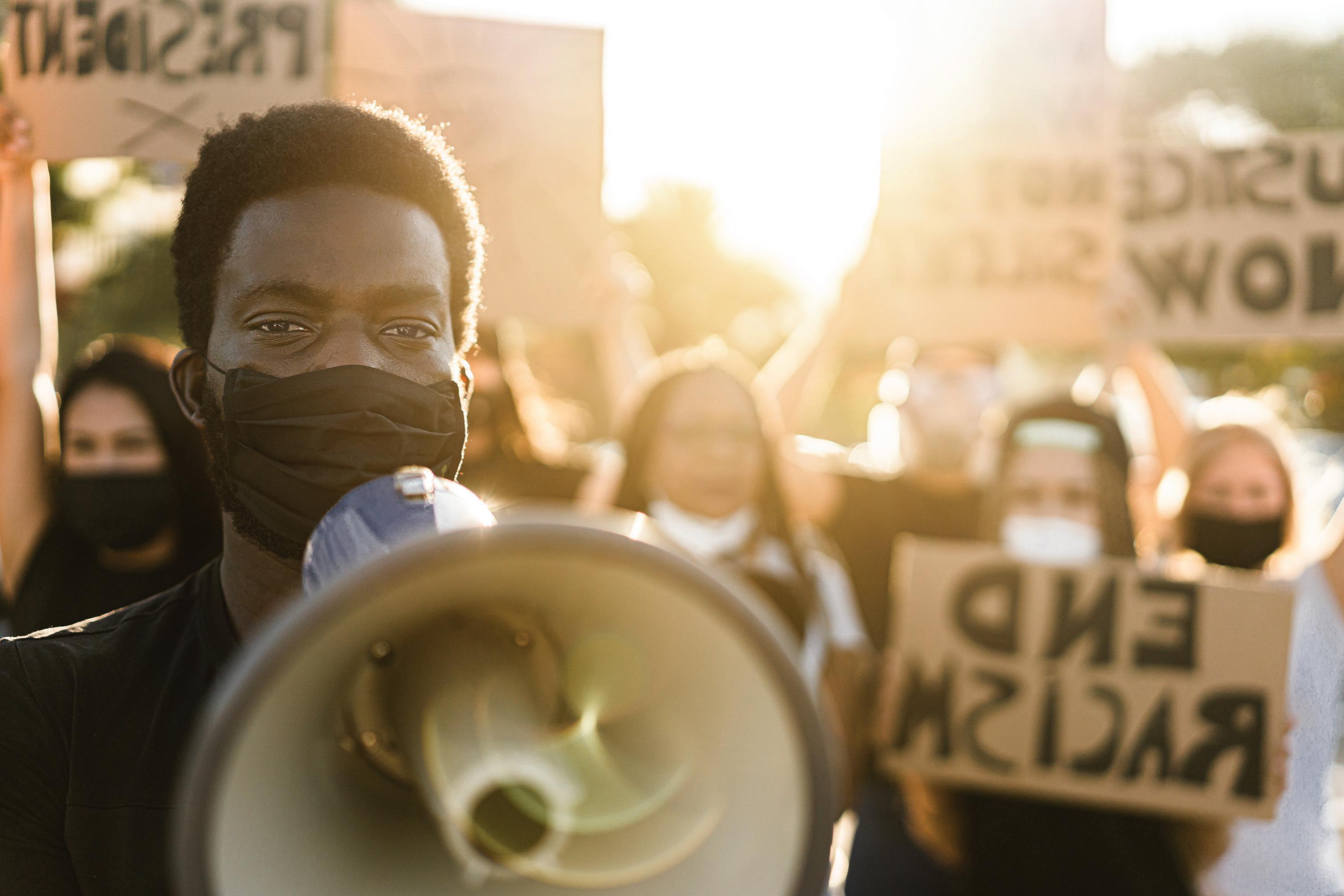
President Cynthia Wilson, Minnesota Lieutenant Gov. Peggy Flanagan, and Karen Wells, whose son, Amir Locke, was killed by a Minneapolis Police Department officer on Feb. 2, 2022.
Although the most recent legislative session passed laws such as the one that guarantees free school meals for every child, and the Child Tax Credit, which are projected to lower child poverty by a third statewide, Flanagan said there was a lot more to do.
“Today is a good day to celebrate, but also a good day to acknowledge that we have so much more work to do,” said Flanagan. “This is simply a down payment for the work that we have to continue to do together.”
Williams, the Minneapolis NAACP president, spoke about the important role the family and the community can play in reducing not only gun violence, but all violence.
“Oftentimes, we say it takes a village to raise a child, but the truth is, it takes a village to raise a family,” Williams said. “And if we go back historically, y’all, we can recognize that the family is what was the foundation to make everything run effectively in
Juneteenth
Continued
our communities. You break up the families, you break up the community.”
For St. Paul resident Bridgette Noel, Juneteenth celebrations have a significant generational value. Noel said she had been participating in Juneteenth celebrations for as long as she could remember. She said she would continue to recognize the importance of the celebration to her children and grandchildren.

“It’s about time,” Noel said. “We’ve come so far. So, so far. Our, ancestors and grandmothers and greatgrandmothers and great-grandfathers paved the way for us, so this is a great way of showing them [that] we finally got it. We finally made it.”
Although the Emancipation Proclamation abolished slavery by on January 1, 1863, enslaved people in Texas didn’t find out that they had been freed until June 19, 1865, when U.S. Maj. Gen. Gordon Granger announced through an executive decree known as General Order No. 3.
In 1866, a group of freed African Americans came together to celebrate the end of centuries of enslavement. The day became known as Juneteenth and is the oldest know holiday celebrating emancipation of enslaved people, according to the National Archives. Juneteenth has since evolved to become one of the most important holidays that commemorate the resilience of the Black community in the United States. It has been a state holiday in Texas since 1980.
Minnesota is one of 27 states that have enacted laws proclaiming Juneteenth an official government holiday. On June 17, 2021, President Joseph R. Biden signed a law that made Juneteenth a federal holiday.
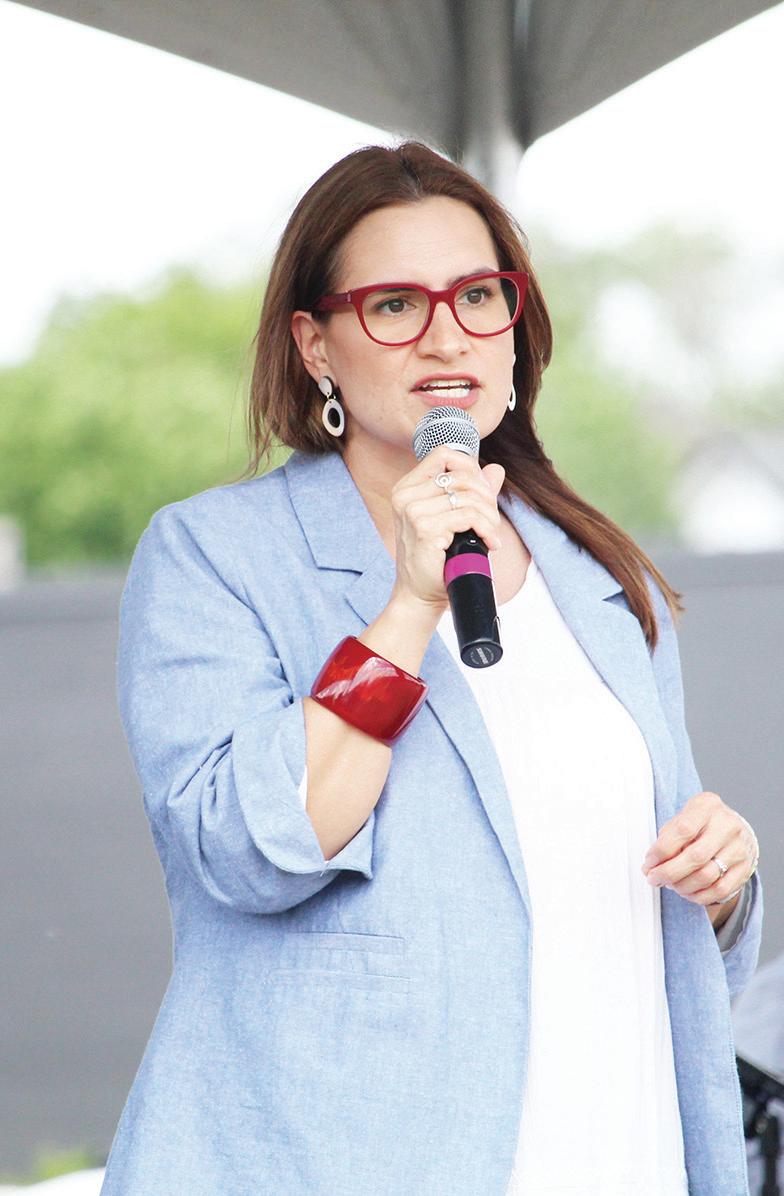


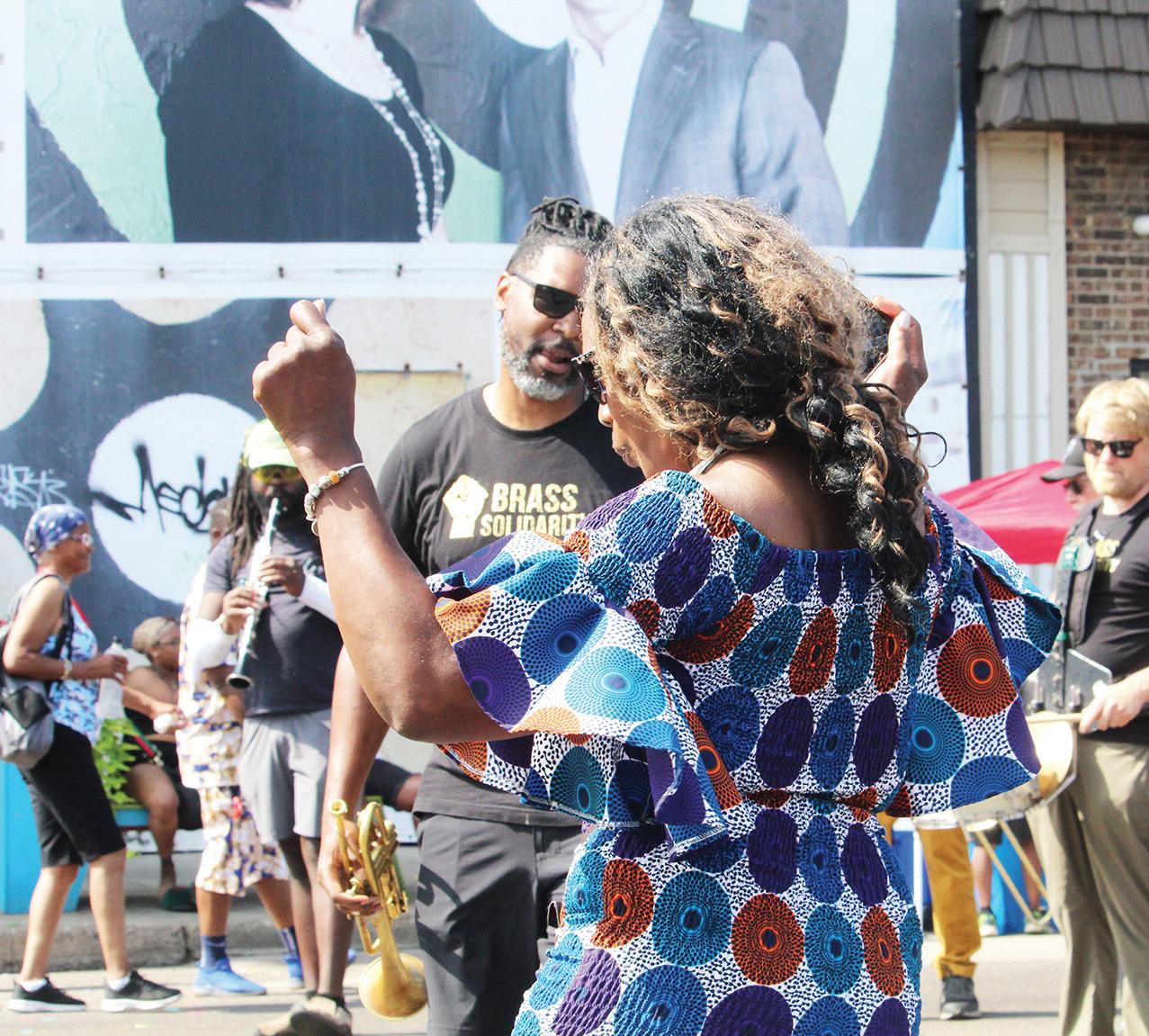

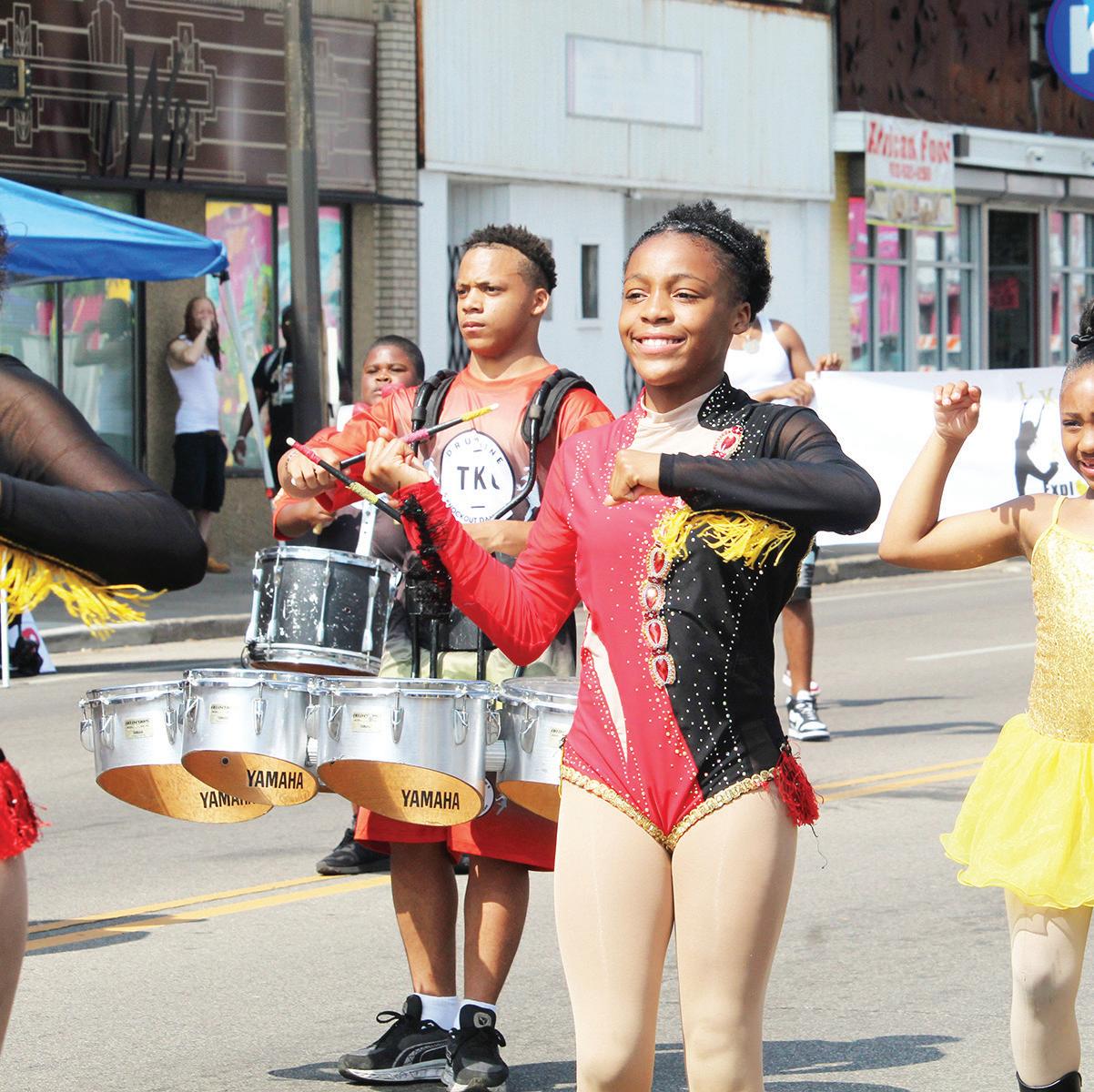

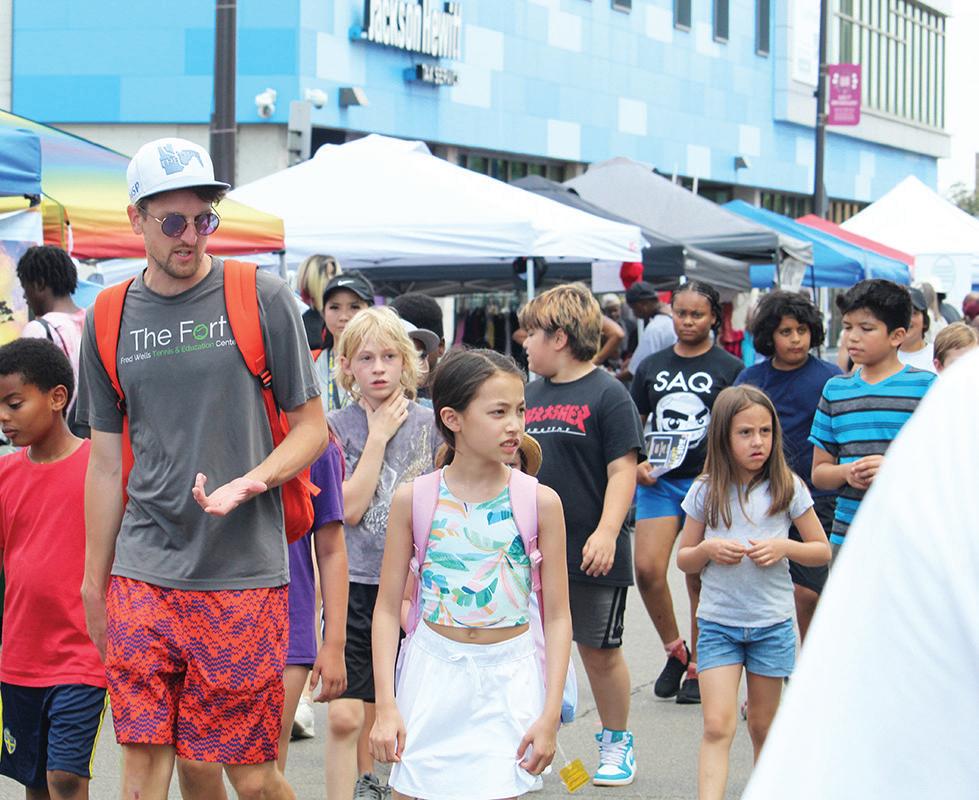
 Photos by Mshale Photojournalist Jasmine Webber
Photos by Mshale Photojournalist Jasmine Webber
The city of Brooklyn Park was on Thursday honored by the League of Minnesota Cities (LMC) with the City of Excellence Award for “Creative Solutions for City Housing Challenges.”

LMC recognized the city for its “Enhanced Inspections via DoorKnocking at Large Apartments” initiative during its annual conference held in Duluth where over 700 elected and appointed officials from cities gathered on Thursday, June 22. It was the highest turnout of the annual event in 20 years, according to League officials.
According to a news release, the City of Excellence Awards are given by LMC to recognize cities for outstanding programs or projects.
The win comes with a plaque, a check for $1,000, and recognition in League publications and promotional activities throughout the coming year.
The city piloted the door-knocking initiative following a study conducted by the University of Minnesota’s Center for Urban and Regional Affairs (CURA) that examined experiences in Brooklyn Park’s large apartment communities.


The CURA study found that those living and managing the large apartment complexes named affordability, safety, and dignity in housing as their major concerns.
Following meetings with various stakeholders, including renters and community leaders, city staff identified large apartment communities that merited an enhanced inspection response. Property managers were then informed when their scheduled door-knocking would take place.
The door-knocking exercise involved informing residents on how to report

concerns to property managers and providing them with information on how to access resources such as emergency assistance, food and housing.

Mr. Jason Newby, the city’s inspections and environmental health manager, praised his staff for the success of the program and attributed it to their ability to “shift and respond” to the growing needs of residents.
“Rental inspectors and community engagement staff piloted a rentercentered proactive door knocking approach focused on addressing maintenance, communication, and other livability concerns,” Mr. Newby said. ” Their dedication and compassion for their work, and the residents of Brooklyn Park, is why this program was a huge success.”


When Edna Adan Ismail, the winner of the 2023 Templeton Prize, began working as a nurse and midwife in 1960s Somalia, she was horrified by the pain and medical complications she saw in patients who’d experienced female genital mutilation.

Her indignation simmered until 1976, when as director of Somalia’s Ministry of Health, she attended a health conference in Sudan where, for the first time, she heard Muslim believers openly condemn FGM.
That message changed everything for Ismail.
“I doubt I would have had the courage or the ability to speak out against FGM if I had not trained as a nurse and if I had not heard from the medical doctor in the Sudan and from the Muslim congregation attending the health conference in Khartoum that FGM was against the teachings of Islam,” Ismail, 85, said in an email to Religion News Service.
Decades later, Ismail is known as a fierce advocate who condemns FGM because of, not despite, her Muslim faith. Ismail is also founder of the Edna Adan University and Edna Adan Hospital, which has reduced the maternal mortality rate in Somaliland by up to 75%.
The Templeton Prize, which comes with an award of 1.1 million British pounds (more than $1.3 million), was established by the late investor and philanthropist Sir John Templeton to honor individuals who use scientific advancements to answer the deepest questions related to humanity’s existence and purpose.
Ismail is the third Muslim, fifth woman and first African woman to receive the prize since its launch in 1973. This award is believed to be the largest international prize won by an individual African woman, according to the Templeton Foundation.
“We are delighted to honor Edna Adan Ismail, a woman who has used the teachings of her faith, the influence of her family, and her education in science to improve the health and opportunities of some of the world’s most vulnerable women and girls,” Heather Templeton Dill, president of the John Templeton Foundation, said in a press release.
Ismail was born in 1937 to an influential, interfaith family in then-British Somaliland. Her mother was a devout Catholic, and her father, a Muslim and prominent doctor, ensured she received a covert education alongside her brother.
Though she was initially interested in surgery, Ismail’s father encouraged her to pursue midwifery, a vocation she quickly embraced. “When you follow that pregnancy from nothing for months, and you hear that heartbeat, you hear a life inside another human being, and to hear it cry and breathe, that’s when you feel the power of God,” Ismail said.
Ismail has been credited with many “firsts” — she’s known as the first Somali woman to have Western nursing training, to have a driver’s license and to hold political authority. It was during her stint as
director of Ministry of Health in Somalia that Ismail became emboldened to tackle FGM, a topic that was often taboo, even in the clinical setting.
Though the medical risks associated with FGM are central to her campaign against it, the issue is also deeply personal for Ismail. When she was 8 years old, her mother subjected her to the operation while her father was out of town. When he returned, he was outraged. “My father’s anger when he found out that I had been cut during his absence from town that day convinced me that what had been done to me was wrong,” she told RNS.
When Ismail began publicly opposing FGM in the mid-’70s, she discovered that the act was contrary to the teachings of all the world’s religions, including Islam. But not everyone agreed. She received threats, and even family members told her to drop the issue, which they saw as “indecent.” But Ismail continued to champion the cause. When civil war broke out in Somalia in the 1980s, she became an adviser at the World Health Organization and was pivotal to bringing about the criminalization of FGM in Djibouti.
After a re-formed Somaliland declared independence in 1991 (though it has not gained international recognition), Ismail traded her career for the chance to build a hospital in her homeland, where health services had been demolished during the war.
Ismail sold her assets and raised outside funds to launch the Edna Adan Maternity Hospital in 2002, built on the site of a former dump and execution ground donated by the government. Edna Adan University, which has trained more than 4,000 health care workers and public health professionals now serving communities throughout East Africa, was added in 2010. Seventy percent of the university’s student body and 80% of the hospital staff are female.
Practitioners at the hospital are still fighting against FGM, which has been performed on more than 200 million women and girls alive today, caring for patients and distributing educational materials to locals and religious leaders. Ismail insists that all people, not just women, must stand against FGM and has urged religious leaders to recognize the urgency of the issue.
“Religious leaders need to take a stronger position and have a louder voice to protect little girls from cruel bodily harm and from pain and unnecessary suffering,” she told RNS.
With the Templeton Prize money, Ismail said she will make a “major contribution” to fund the purchase of medical equipment, the hiring of experts and an expansion at the hospital. She will deliver the Templeton Prize lecture in London this fall. Among the 52 prize recipients are Archbishop Desmond Tutu, Mother Teresa, Francis Collins and Billy Graham.
Going forward, Ismail told RNS she hopes the university and hospital established in her name will outlive her. Her dream is for it to serve all who need it, especially the poor, and that it “will continue to function and flourish without me and beyond my life.”
The Cedar’s events manager and volunteer coordinator, Jared Hemming, introduced Jupiter & Okwess with a flourish, but the band did not appear. Instead we watched for several minutes a documentary film introducing the band and placing them in their country with its political and social turmoil as well as its depth of culture and music.
Then Jupiter Bokondji along with his band Okwess stormed the stage at The Cedar on Tuesday night, June 20th performing irresistible dance music straight out of the roots of their Congolese home.

Visual images played on the screen throughout their performance, a melange of African art, masks, political and social commentary, soldiers, children, dancing, and musicians all displayed and juxtaposed with geometric vibrantly colored shapes.
They played their hearts out despite the small crowd of fewer than seventy people as if the joy of the music was all they needed to motivate themselves.

In the mostly standing audience, we danced. Some of us danced with abandon, so much so that Jupiter pulled
one of the dancers on stage. The yoga and Pilates instructor didn’t hesitate, but leaped into the limelight and added to the highly entertaining evening.
The band played for 75 minutes, one song rapidly followed by another in many languages of the Democratic Republic of Congo including Lingala, Tetela, Ekonda, Mongo and Tshiluba. Jupiter occasionally spoke a word or two to the audience in French. He would have liked to say more, but was unwilling to attempt much more English than Thank you and Let’s Go!!
His most powerful voice was in the music he made. He sang, shouted, growled, trilled, and laughed with gusto. Not only Jupiter, but also bass guitarist, Yende Balamba Bongongo, often floored us with his rich bass voice that could easily compare to the powerful voices heard at the Lincoln Center in New York City.
Rounding out the band, Eric MaluMalu Muginda on rhythm guitar and Richard Kabanga Kasonga on guitar. Drummer, Montana Kinunu Ntunu, wore a mask a la Spiderman, but Montana’s mask was decorated with metallic wings along the side of his head and a wing-design highlighting his eyes. After the show, he told me in French he did it for a mystical effect.
The Cedar was in top form, their sound system on par with the fantastic, compelling sound coming from the band. Between the funk, Soukous, and AfroPop pummeling us in the best way, I’d look askance at the low turn-out, yet thankful that those of us
who were there found the exuberant music as thrilling to listen to as the musicians found it thrilling to play.
I hope they return. I’m ready to dance myself ragged again.
His first football season, Isaiah told us, ‘Wear a jersey with my name on it. I want everyone to know you’re here for me.’

Join Books For Africa supporters from near and far in Minneapolis, Minnesota to celebrate 35 years and launch our newest initiative: A Book For Every Child.




The event features dinner, live music, and the chance to connect with BFA supporters from around the world.
SEPTEMBER 13TH, 2023






